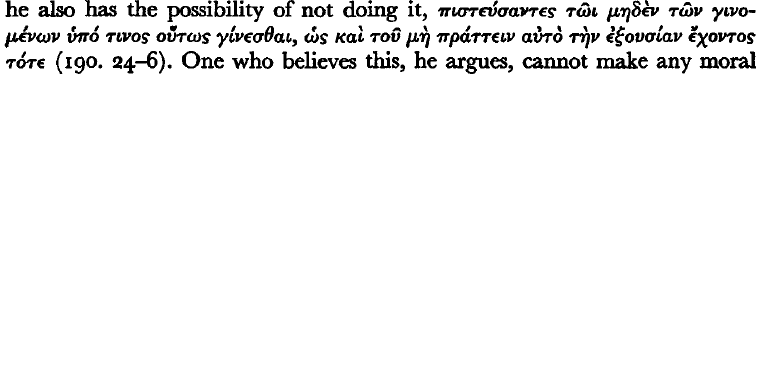Refine search
Actions for selected content:
60618 results in Classical studies (general)
Alexander of Aphrodisias, De Fato 190. 26 ff.1
-
- Journal:
- The Classical Quarterly / Volume 25 / Issue 1 / May 1975
- Published online by Cambridge University Press:
- 11 February 2009, pp. 158-159
- Print publication:
- May 1975
-
- Article
- Export citation
Propertius 4. 1. 9
-
- Journal:
- The Classical Quarterly / Volume 25 / Issue 1 / May 1975
- Published online by Cambridge University Press:
- 11 February 2009, pp. 155-156
- Print publication:
- May 1975
-
- Article
- Export citation
Three Non-Roman Blood Sports
-
- Journal:
- The Classical Quarterly / Volume 25 / Issue 1 / May 1975
- Published online by Cambridge University Press:
- 11 February 2009, pp. 117-122
- Print publication:
- May 1975
-
- Article
- Export citation
Aristophanes, Wasps 897: κλ
 οс сύκινοс
οс сύκινοс
-
- Journal:
- The Classical Quarterly / Volume 25 / Issue 1 / May 1975
- Published online by Cambridge University Press:
- 11 February 2009, p. 151
- Print publication:
- May 1975
-
- Article
- Export citation
On Homer's Winged Words
-
- Journal:
- The Classical Quarterly / Volume 25 / Issue 1 / May 1975
- Published online by Cambridge University Press:
- 11 February 2009, pp. 1-12
- Print publication:
- May 1975
-
- Article
- Export citation
Roma, Constantinopolis, the Emperor, and his Genius*
-
- Journal:
- The Classical Quarterly / Volume 25 / Issue 1 / May 1975
- Published online by Cambridge University Press:
- 11 February 2009, pp. 131-150
- Print publication:
- May 1975
-
- Article
- Export citation
A Match for Alcestis: Plutarch Mor. 243 d
-
- Journal:
- The Classical Quarterly / Volume 25 / Issue 1 / May 1975
- Published online by Cambridge University Press:
- 11 February 2009, pp. 157-158
- Print publication:
- May 1975
-
- Article
- Export citation
The Age, Ancestry, and Career of Gordian I
-
- Journal:
- The Classical Quarterly / Volume 25 / Issue 1 / May 1975
- Published online by Cambridge University Press:
- 11 February 2009, pp. 123-130
- Print publication:
- May 1975
-
- Article
- Export citation
Lucretius' Methods of Argument (3.417–614)
-
- Journal:
- The Classical Quarterly / Volume 25 / Issue 1 / May 1975
- Published online by Cambridge University Press:
- 11 February 2009, pp. 94-116
- Print publication:
- May 1975
-
- Article
- Export citation
A Komos in Valerius Aedituus
-
- Journal:
- The Classical Quarterly / Volume 25 / Issue 1 / May 1975
- Published online by Cambridge University Press:
- 11 February 2009, pp. 152-153
- Print publication:
- May 1975
-
- Article
- Export citation
The Moon's Horses
-
- Journal:
- The Classical Quarterly / Volume 25 / Issue 1 / May 1975
- Published online by Cambridge University Press:
- 11 February 2009, pp. 153-155
- Print publication:
- May 1975
-
- Article
- Export citation
Aristotle, De Insomniis 462a18
-
- Journal:
- The Classical Quarterly / Volume 25 / Issue 1 / May 1975
- Published online by Cambridge University Press:
- 11 February 2009, pp. 151-152
- Print publication:
- May 1975
-
- Article
- Export citation
Women in Greek Inheritance Law
-
- Journal:
- The Classical Quarterly / Volume 25 / Issue 1 / May 1975
- Published online by Cambridge University Press:
- 11 February 2009, pp. 53-57
- Print publication:
- May 1975
-
- Article
- Export citation
The Case of Valeria: An Inheritance-Dispute in Roman Asia
-
- Journal:
- The Classical Quarterly / Volume 25 / Issue 1 / May 1975
- Published online by Cambridge University Press:
- 11 February 2009, pp. 82-87
- Print publication:
- May 1975
-
- Article
- Export citation
Urban Settlement in the Second Chapter of Thucydides1
-
- Journal:
- The Classical Quarterly / Volume 25 / Issue 1 / May 1975
- Published online by Cambridge University Press:
- 11 February 2009, pp. 26-40
- Print publication:
- May 1975
-
- Article
- Export citation
Leo Strauss: Xenophon's Socrates. Pp. 181. Ithaca and London: Cornell University Press, 1972. Cloth. £3·85.
-
- Journal:
- The Classical Review / Volume 25 / Issue 1 / April 1975
- Published online by Cambridge University Press:
- 27 February 2009, p. 143
- Print publication:
- April 1975
-
- Article
- Export citation
The Literature of Rome - Ludwig Bieler: Geschichte der römischen Literatur. 3., verbesserte Auflage. 2 vols. i Die Literatur der Republik; ii Die Literatur der Kaiserzeit. (Sammlung Göschen 4052, 4053.) Pp. 153, 132. Berlin: de Gruyter, 1972. Paper, DM.7.80 each.
-
- Journal:
- The Classical Review / Volume 25 / Issue 1 / April 1975
- Published online by Cambridge University Press:
- 27 February 2009, pp. 63-64
- Print publication:
- April 1975
-
- Article
- Export citation
Laterculi Praesidum - Benedictus Thomae: Laterculi praesidum. Vol. ii: Tabulae synchronae, fasc. 1. Appendix: Provinciae Africae. Pp. 60+xvi. Gothenburg Bokförlaget Radius, 1972. Paper, kr.35.70.
-
- Journal:
- The Classical Review / Volume 25 / Issue 1 / April 1975
- Published online by Cambridge University Press:
- 27 February 2009, pp. 111-112
- Print publication:
- April 1975
-
- Article
- Export citation
The Greek Dark Ages - V. R. d'A. Desborough: The Greek Dark Ages. Pp. 388; 60 pls., 39 figs., 5 maps and plans. London: Benn, 1972. Cloth, £5.
-
- Journal:
- The Classical Review / Volume 25 / Issue 1 / April 1975
- Published online by Cambridge University Press:
- 27 February 2009, pp. 84-87
- Print publication:
- April 1975
-
- Article
- Export citation
E. Lane: Corpus Monumentorum Religionis Dei Menis (CMRDM). Vol. i: The Monuments and Inscriptions. (Études Préliminaires aux Religions Orientales dans l'Empire Romain, 19.) Pp. xii+173. 105 pls., 36 figs., 2 maps. Leiden: Brill, 1971. Cloth, fl.142.
-
- Journal:
- The Classical Review / Volume 25 / Issue 1 / April 1975
- Published online by Cambridge University Press:
- 27 February 2009, pp. 160-161
- Print publication:
- April 1975
-
- Article
- Export citation
 ) is grounded in the fact that a man is the
) is grounded in the fact that a man is the  of his own actions (cf. Aristotle, E.N. 3. 1111a21, 1112b31, etc.). The opponents of this view, he says, hold that nothing performed by a man is such that at the time when he does something he also has the possibility of not doing it,
of his own actions (cf. Aristotle, E.N. 3. 1111a21, 1112b31, etc.). The opponents of this view, he says, hold that nothing performed by a man is such that at the time when he does something he also has the possibility of not doing it,  (190. 24–6). One who believes this, he argues, cannot make any moral judgements or do any of the things ‘which ought reasonably to be brought about by those who have believed the possibility also of doing each of the things which they do’. My translation has, I hope, shown the need for a negative in the last clause: ‘the possibility also of not doing’ is the point needed; so insert
(190. 24–6). One who believes this, he argues, cannot make any moral judgements or do any of the things ‘which ought reasonably to be brought about by those who have believed the possibility also of doing each of the things which they do’. My translation has, I hope, shown the need for a negative in the last clause: ‘the possibility also of not doing’ is the point needed; so insert  between
between  and
and  . For omission of the negative elsewhere in
. For omission of the negative elsewhere in  οс сύκινοс
οс сύκινοс
 . Commentators see the same pun earlier in the play at 145, although in that passage the sense may be adequate without the pun; the adjective
. Commentators see the same pun earlier in the play at 145, although in that passage the sense may be adequate without the pun; the adjective  does not necessarily constitute a joke in itself but is perhaps chosen deliberately to lead into the joke.
does not necessarily constitute a joke in itself but is perhaps chosen deliberately to lead into the joke. ) as Alcestis was, nor Cornelia high-minded in the manner of Olympias’ (243d). All the examples are well known, and quite apposite, except for Irene (
) as Alcestis was, nor Cornelia high-minded in the manner of Olympias’ (243d). All the examples are well known, and quite apposite, except for Irene ( ). Who is this paragon of wifely love? A search through encyclopedias and mythological handbooks proves fruitless. Wyttenbach in his note ad loc. suggested the courtesan friend of a minor Ptolemy killed at Ephesus (Athen. 13. 593 a-b), yet this extremely obscure figure hardly merits mention in the same breath with Alcestis. The name must be corrupt.
). Who is this paragon of wifely love? A search through encyclopedias and mythological handbooks proves fruitless. Wyttenbach in his note ad loc. suggested the courtesan friend of a minor Ptolemy killed at Ephesus (Athen. 13. 593 a-b), yet this extremely obscure figure hardly merits mention in the same breath with Alcestis. The name must be corrupt. in Aristotle. For here, exceptionally, it has been taken to refer to sense-perceptions rather than images.
in Aristotle. For here, exceptionally, it has been taken to refer to sense-perceptions rather than images. ), and, more particularly, one which occurs in sleep; since the phantoms just mentioned are not dreams, nor is any other a dream which presents itself when the sense-perceptions are in a state of freedom.
), and, more particularly, one which occurs in sleep; since the phantoms just mentioned are not dreams, nor is any other a dream which presents itself when the sense-perceptions are in a state of freedom.  are disputed, rendering the whole passage difficult. In the most widely established version,
are disputed, rendering the whole passage difficult. In the most widely established version,  while
while  —‘Evidence for the statement that Athens grew morethan other places because of migration is provided by the following, viz. that...’ This is consistent with taking either Athens or the other places as the subject of the infinitive, ‘Athens grew more’ or ‘the other places grew less’. If
—‘Evidence for the statement that Athens grew morethan other places because of migration is provided by the following, viz. that...’ This is consistent with taking either Athens or the other places as the subject of the infinitive, ‘Athens grew more’ or ‘the other places grew less’. If  recapitulates the end of 2.2,
recapitulates the end of 2.2,  appears to refer to those migrations; but since it is a rare word, abnormal in that sense, and
appears to refer to those migrations; but since it is a rare word, abnormal in that sense, and  is obscure, Ullrich (
is obscure, Ullrich ( , which makes a straight reference to migration, disposes of the obscurity, and provides an explicit subject for the infinitive. Gomme accepts this. I disagree, but yet believe that the established version, though capable of much improvement, is the best to date.
, which makes a straight reference to migration, disposes of the obscurity, and provides an explicit subject for the infinitive. Gomme accepts this. I disagree, but yet believe that the established version, though capable of much improvement, is the best to date.